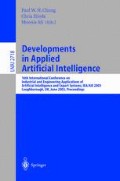Abstract
One important class of problems in Multi-Agent Systems (MASs) is planning, that is constructing an optimal policy for each agent with the objective of reaching some terminal goal state. The key aspect of multi-agent planning is coordinating the actions of the individual agents. This coordination may be done through communication, learning, or conventions imposed at design time. In this paper we present a new taxonomy of MASs that is based on the notions of optimality and rationality. A framework that describes the interactions between the agents and their environment is given, along with a reinforcement learning-based algorithm (Q-learning) for learning a joint optimal plan. Finally, we give some experimental results on grid games that show the convergence of this algorithm.
Access this chapter
Tax calculation will be finalised at checkout
Purchases are for personal use only
Preview
Unable to display preview. Download preview PDF.
References
Boutilier C., “Planning, Learning and Coordination in Multiagent Decision Processes,” In Proceedings of the Sixth Conference on Theoretical Aspects of Rationality and Knowledge, pp. 195–210, Amsterdam, 1996.
Hu J. and Wellman M. P., “Multiagent Reinforcement Learning: Theoretical Framework and an Algorithm,” In Proceedings of the Fifteenth International Conference on Machine Learning, pp. 242–250, San Francisco, CA, 1998.
Hu J. and Wellman M. P., “Experimental Results on Q-Learning for General-Sum Stochastic Games,” In Proceedings of the 17th International Conference on Machine Learning, pp. 407–414, 2000.
Littman M. L., “Markov games as a framework for multi-agent reinforcement learning,” In Proceedings of the Eleventh International Conference on Machine Learning, pp. 157–163, New Brunswick, NJ, 1994.
Tan M., “Multi-Agent Reinforcement Learning: Independent vs. Cooperative Agents,” In Proceedings of the Tenth International Conference on Machine Learning, pp. 330–337, 1993.
Author information
Authors and Affiliations
Editor information
Editors and Affiliations
Rights and permissions
Copyright information
© 2003 Springer-Verlag Berlin Heidelberg
About this paper
Cite this paper
Gomaa, W.E., Saad, A.A., Ismail, M.A. (2003). Learning Joint Coordinated Plans in Multi-agent Systems. In: Chung, P.W.H., Hinde, C., Ali, M. (eds) Developments in Applied Artificial Intelligence. IEA/AIE 2003. Lecture Notes in Computer Science(), vol 2718. Springer, Berlin, Heidelberg. https://doi.org/10.1007/3-540-45034-3_16
Download citation
DOI: https://doi.org/10.1007/3-540-45034-3_16
Published:
Publisher Name: Springer, Berlin, Heidelberg
Print ISBN: 978-3-540-40455-2
Online ISBN: 978-3-540-45034-4
eBook Packages: Springer Book Archive

